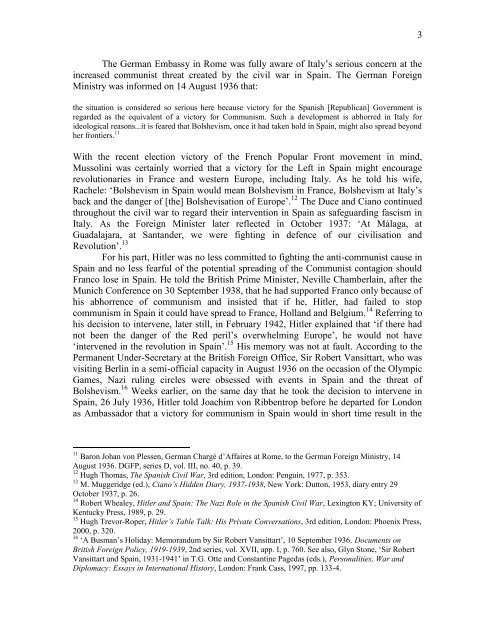Stone, G. (2009) Italo-German collaboration and the Spanish Civil ...
Stone, G. (2009) Italo-German collaboration and the Spanish Civil ...
Stone, G. (2009) Italo-German collaboration and the Spanish Civil ...
Create successful ePaper yourself
Turn your PDF publications into a flip-book with our unique Google optimized e-Paper software.
The <strong>German</strong> Embassy in Rome was fully aware of Italy‟s serious concern at <strong>the</strong><br />
increased communist threat created by <strong>the</strong> civil war in Spain. The <strong>German</strong> Foreign<br />
Ministry was informed on 14 August 1936 that:<br />
<strong>the</strong> situation is considered so serious here because victory for <strong>the</strong> <strong>Spanish</strong> [Republican] Government is<br />
regarded as <strong>the</strong> equivalent of a victory for Communism. Such a development is abhorred in Italy for<br />
ideological reasons...it is feared that Bolshevism, once it had taken hold in Spain, might also spread beyond<br />
her frontiers. 11<br />
With <strong>the</strong> recent election victory of <strong>the</strong> French Popular Front movement in mind,<br />
Mussolini was certainly worried that a victory for <strong>the</strong> Left in Spain might encourage<br />
revolutionaries in France <strong>and</strong> western Europe, including Italy. As he told his wife,<br />
Rachele: „Bolshevism in Spain would mean Bolshevism in France, Bolshevism at Italy‟s<br />
back <strong>and</strong> <strong>the</strong> danger of [<strong>the</strong>] Bolshevisation of Europe‟. 12 The Duce <strong>and</strong> Ciano continued<br />
throughout <strong>the</strong> civil war to regard <strong>the</strong>ir intervention in Spain as safeguarding fascism in<br />
Italy. As <strong>the</strong> Foreign Minister later reflected in October 1937: „At Málaga, at<br />
Guadalajara, at Sant<strong>and</strong>er, we were fighting in defence of our civilisation <strong>and</strong><br />
Revolution‟. 13<br />
For his part, Hitler was no less committed to fighting <strong>the</strong> anti-communist cause in<br />
Spain <strong>and</strong> no less fearful of <strong>the</strong> potential spreading of <strong>the</strong> Communist contagion should<br />
Franco lose in Spain. He told <strong>the</strong> British Prime Minister, Neville Chamberlain, after <strong>the</strong><br />
Munich Conference on 30 September 1938, that he had supported Franco only because of<br />
his abhorrence of communism <strong>and</strong> insisted that if he, Hitler, had failed to stop<br />
communism in Spain it could have spread to France, Holl<strong>and</strong> <strong>and</strong> Belgium. 14 Referring to<br />
his decision to intervene, later still, in February 1942, Hitler explained that „if <strong>the</strong>re had<br />
not been <strong>the</strong> danger of <strong>the</strong> Red peril‟s overwhelming Europe‟, he would not have<br />
„intervened in <strong>the</strong> revolution in Spain‟. 15 His memory was not at fault. According to <strong>the</strong><br />
Permanent Under-Secretary at <strong>the</strong> British Foreign Office, Sir Robert Vansittart, who was<br />
visiting Berlin in a semi-official capacity in August 1936 on <strong>the</strong> occasion of <strong>the</strong> Olympic<br />
Games, Nazi ruling circles were obsessed with events in Spain <strong>and</strong> <strong>the</strong> threat of<br />
Bolshevism. 16 Weeks earlier, on <strong>the</strong> same day that he took <strong>the</strong> decision to intervene in<br />
Spain, 26 July 1936, Hitler told Joachim von Ribbentrop before he departed for London<br />
as Ambassador that a victory for communism in Spain would in short time result in <strong>the</strong><br />
11<br />
Baron Johan von Plessen, <strong>German</strong> Chargé d‟Affaires at Rome, to <strong>the</strong> <strong>German</strong> Foreign Ministry, 14<br />
August 1936. DGFP, series D, vol. III, no. 40, p. 39.<br />
12<br />
Hugh Thomas, The <strong>Spanish</strong> <strong>Civil</strong> War, 3rd edition, London: Penguin, 1977, p. 353.<br />
13<br />
M. Muggeridge (ed.), Ciano’s Hidden Diary, 1937-1938, New York: Dutton, 1953, diary entry 29<br />
October 1937, p. 26.<br />
14<br />
Robert Whealey, Hitler <strong>and</strong> Spain: The Nazi Role in <strong>the</strong> <strong>Spanish</strong> <strong>Civil</strong> War, Lexington KY; University of<br />
Kentucky Press, 1989, p. 29.<br />
15 Hugh Trevor-Roper, Hitler’s Table Talk: His Private Conversations, 3rd edition, London: Phoenix Press,<br />
2000, p. 320.<br />
16 „A Busman‟s Holiday: Memor<strong>and</strong>um by Sir Robert Vansittart‟, 10 September 1936. Documents on<br />
British Foreign Policy, 1919-1939, 2nd series, vol. XVII, app. I, p. 760. See also, Glyn <strong>Stone</strong>, „Sir Robert<br />
Vansittart <strong>and</strong> Spain, 1931-1941‟ in T.G. Otte <strong>and</strong> Constantine Pagedas (eds.), Personalities, War <strong>and</strong><br />
Diplomacy: Essays in International History, London: Frank Cass, 1997, pp. 133-4.<br />
3

















